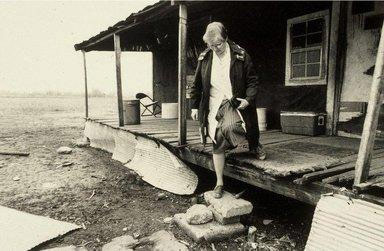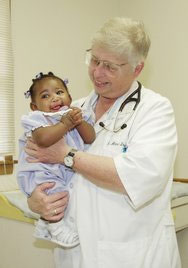Oct 16
2012
Dr. Anne Brooks, a Nun, is the House-calling Country Physician Everyone of Us Wishes We Could Have

I’ve known Dr. Anne Brooks for nearly three years and I consider her a friend. She’s always receptive, available and willing to lend an ear, and offers insight I can only hope to have one day.
Plus, her stories are chronicle-like and filled with wit, humor and poignancy. And she’s got a tomb’s worth of them she could tell, and probably should. But, perhaps she doesn’t have the time. She’s too busy caring for the folks of her adopted hometown of Tutwiler, Mississippi.
Dr. Brooks is a nun. She’s taken a vow of poverty. In Tutwiler, she’s needed it. The people here are part of the one of the poorest in the United States. Patients pay for their care, if they can, with vegetables or other goods. Some times they drop a few bucks on the counter, but it’s a guarantee that by the end of the year, the clinic – Tutwiler Clinic – is going to be significantly short of operating funds.
More than 75 percent of its operating funds come from donations by individuals and grants. Those who wish can contribute through a PayPal donate button on the clinic’s site.
The Tutwiler Clinic is a nonprofit founded in 1983 by Dr. Brooks, D.O. and three other Sisters of the Holy Names. Its purpose is to provide wholistic healthcare in Tallahatchie County, located in the middle of the Mississippi Delta. According to its site, the median household income in the county is $18,800, while the US poverty level for a family of four is set at $20,650.
Two-thirds of the clinic’s new patients have no Medicare or Medicaid or other health coverage assistance. To say Brooks has operated the clinic as a personal mission for the last 20 years is no understatement.
The clinic is her calling; Tutwiler is her home.
She became a physician at age 40, following a career in education. However, for 17 years prior, from the time she became a nun, she was confined to a wheelchair because of what had been diagnosed as severe rheumatoid arthritis. She eventually met a physician in Clearwater, Florida, who asked to treat her and through osteopathic methods and acupuncture, eventually she was out of the chair and walking again.
The same doctor to help treat her was the same physician who encouraged her to join him in the medical ranks. She acquiesced and eventually began to study.
When she graduated, she wandered around the south through Mississippi, Louisiana and Florida seeking a clinic to serve. Next, she wrote several letters to towns that were in medically deprived areas offering her services. Tutwiler was only community to respond.
The town gave her a few funds to refurbish the clinic that had been shuttered since the early 1960s and she opened it in August 1983. By January she was seeing more than 700 patients a month. The clinic had a segregated waiting area when she arrived, but she immediately changed tat.
She serves as medical director and chief administrator at the Tutwiler Clinic, serving about 8,500 patients a year. She also is Chief of the Department of Medicine at the Northwest Mississippi Regional Medical Center in Clarksdale, where she has also is on the board of trustees and has served as Chief of Staff.
She is one of three doctors in the county, and currently mentors two medical students. She admits that she is desperate for another doctor at the clinic, which has a staff of 30.
She prays every day for anew doctor to join their staff, but to date (she’s been searching nonstop for months) she’s received little interest.

Brooks is a country doctor in so many ways, like you’d imagine from the 19th century: she makes house calls, and has seen the greatest level of poverty and unhealthful living. Her heart seems to explode with passion for those she cares for and the folks she cares for often suffer from sever chronic conditions, such obesity and diabetes, because of lack of quality nutrition because of their poverty.
She prays a lot for them. When she’s not praying, the 74-year-old who works 12 hour days, most days a week. She believes in wholistic care — taking care of the whole person and enabling a person to care for themselves.
When not providing care, she and her staff run a Habitat for Humanity program that has built 37 homes, and she also started a second-hand clothing store and a community center, with a gym and library and helps residents learn everything from life skills like cooking, to earning a GED, to staying fit with Zumba. To fund the community center, they sell locally made quilts.
Even though she lives in a world seemingly lost, if not a little forgotten, she’s dedicated the Tutwiler Clinic to employing the most current tools to ensure her patients receive the best care possible.
As such, she utilizes an electronic health record.
In her 20 years as a physician, “Care has changed in many, many ways,” she said recently.
There are new forms of care, new understandings of how various body systems that medicine can affect, and, most notable to her, are genome studies and the potential for tailoring medicine to a specific patient.
“You know, every direction you turn, especially in your area of expertise, there are new and exciting ideas about integrating medical records seamlessly into patient care,” she said, “or should it be the other way around?”
Perhaps it makes no matter. Machine at her side or not, she still knows how to provide the best care she knows how to provide, and the people she cares for are blessed to have her at home in her community. In many cases, they owe her their lives; at the very least she should be given some thanks.
Perhaps that’s why the American Osteopathic Foundation recently named her the 2012 physician of the year.